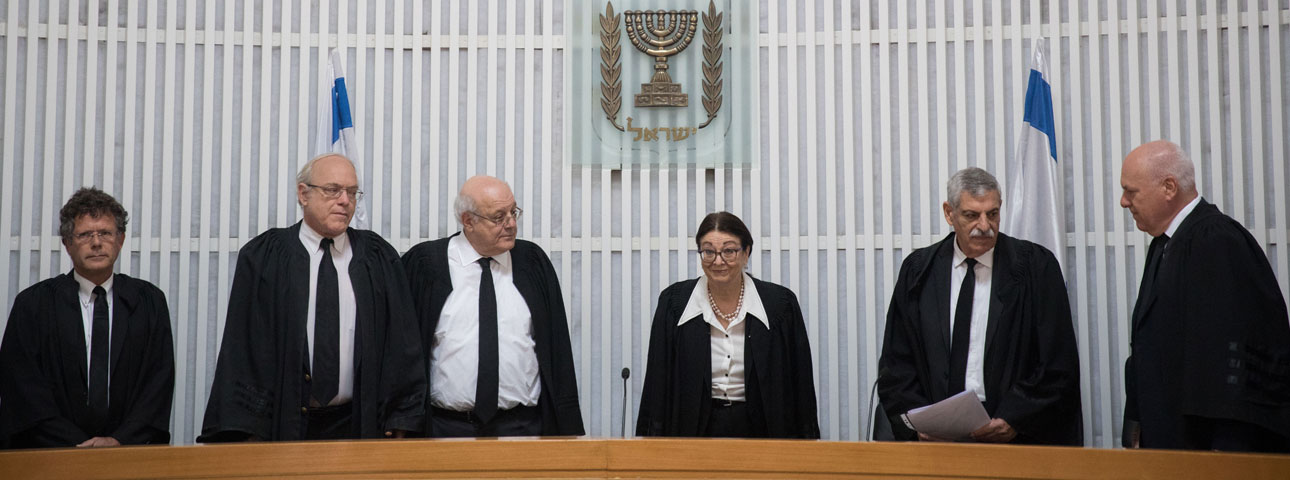A Test of Reasonableness

Flash 90
The bizarre constitutional situation in which we now find ourselves raises a great many legal questions, not all of which have simple answers. Without going too deep into this maze, we can say that according to Attorney General Mandelblit’s interpretation of Israel’s Basic Law: The Government, the prime minister currently has the power to fire ministers, and to appoint Knesset members as ministers in their place—both of which he has indeed done.
If this is the case, it begs the question: Does the law allow the prime minister to fire all the government’s ministers? Can he serve as “the government” by himself—that is – literally an “Only Bibi” government --as in the election slogan? Could he also serve as Minister of Justice, even as criminal proceedings are being brought against him, obviously creating a clear conflict of interests? According to the letter of the law, the answer to all these questions is “yes.” The only legal barrier to such an absurd situation is the administrative review of the government’s actions by the High Court of Justice, and in this case-- the only condition preventing the prime minister from serving as Minister of Justice (as the Attorney General has already made clear) or holding all the ministerial portfolios, is the requirement to act reasonably, which is the basis for judicial review.
Despite attempts to blacken its name, the reasonableness standard, or to be more precise, the “extreme unreasonableness” standard is not an invention of the Israeli legal system. Its roots lie in English law, but it is common in many other countries as well. Its purpose is to prevent the government from passing entirely arbitrary decisions; but it is certainly not intended to replace the decision-making powers of the government, with those of the court. Like all other administrative law standards (the rules of natural justice, and standards such as the ban on extraneous interests and the requirement to take all relevant considerations into account), it is meant to ensure that the government does not exceed the boundaries of its law-given authority. Acting in an obviously unreasonable manner, which means giving certain considerations far too much weight relative to others, constitutes an abuse of legal powers.
The claims that judicial review thwarts the “will of the people”—even in cases in which it is ministerial decisions that are under review—are nothing but misguided populism. When a minister takes a certain decision, this does not automatically mean that he or she is giving a voice to the “will of the people,” or even to the “will of the majority” (and in a democracy worthy of the name, there are restrictions on majority rule). The best reflection of the “will of the people”—and of its sovereignty—is the law. Thus, administrative review, which is meant to ensure that the government complies with the law and does not overstep its authority, while ensuring that decisions are made without conflict of interests or under the influence of extraneous interests, is what constitutes oversight of the executive branch. It ensures that the government complies with the law as which an expression of the will of the sovereign people via its representatives in the Knesset, who pass laws through a serious legislative procedure, as opposed to the administrative decisions of a single person. It should also be noted that if the Knesset believes that the court’s interpretation of the scope of the government’s powers as granted by the law is mistaken and harmful, it always has the power to change the law. This has indeed been the Knesset’s response following certain court rulings on administrative issues. In this matter, it is the legislators, and not the courts, who have the last word.
A transitional government has less leeway with regard to reasonableness than do regular governments. This is all the more so in the case of a transitional government such as the current one , which did not win and then lose the support of the Knesset, but rather--one which never enjoyed a Knesset majority. In 2001, Prof. Hillel Weiss and several others (including Moshe Feiglin) petitioned the High Court of Justice against Prime Minister Barak, who intended to conduct negotiations with Arafat after having resigned. The petition argued that the transitional government had overstepped its authority by holding foreign policy negotiations. Justice Barak, in a majority ruling, rejected the petition, but his judgement also conveyed a clear message that the boundaries of reasonableness allowing a transitional government to make dramatic decisions are more limited than those of a regular government. He also noted that this ruling was based on the commitment of the then Attorney General, that any agreement, if reached, would be conditional on the approval of the Knesset. The court rightly set limitations on transitional governments, using the reasonableness standard.
Doing away with administrative review of elected officials (even if only by diluting or revoking the reasonableness standard), as was the intention of the coalition that Netanyahu was ultimately unable to form, in order to prevent oversight of Knesset decisions regarding parliamentary immunity, is an act that would leave all of us citizens defenseless before the caprices of the ruling regime. Israel would be a state in which the rule of law would be undermined, and essentially unenforceable.
The article was published in the Jerusalem Post.
